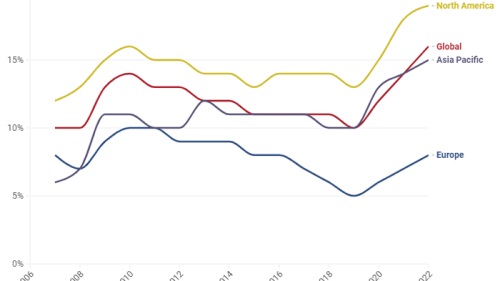Inbound tourism is a bright spot for the Japanese economy, according to panelists at the recent ULI Japan Spring Conference in Tokyo, and the market is developing rapidly to cope.
Japan welcomed just under 20 million visitors last year and is targeting 40 million arrivals by 2020, the year Tokyo holds the Summer Olympics. Conference panelists said that the Japanese government is having trouble keeping up with the pace of change in the tourism industry. For example, due to licensing requirements, 99 percent of Airbnb apartment owners in Japan are technically breaking existing laws. However, the government is trying to ease the regulation requirements and is not pursuing rule breakers.
Japan has even developed its own term for the sharing economy holiday phenomenon, minpaku, which means “home stay.” Yasuhiro Kamayama, founder of online travel site Hyakusenrenma, said he believed the sharing economy could solve two Japanese problems. “We don’t have enough hotel rooms for the growing number of tourists and we have vacant houses due to the falling population.”
Hyakusenrenma has platforms for both urban and rural home sharing and Kamayama said as tourism numbers continue to grow, visitors will begin to visit provincial and rural Japan, having begun with the country’s cities.
Serviced-apartment operator Oakwood and hotel chain Lanson Place said they did not consider Airbnb to be a competitor. Martin Fluck, director of operations, North Asia, for Oakwood Pacific, said, “We are not afraid of Airbnb coming into the market. We offer a different service level to Airbnb, so we see them as complementary, not as competitors.”
Fluck said a new market for serviced-apartment operators was the “bleisure” traveler, who tags leisure time onto a business trip. He said that 60 percent of business travelers have added leisure to business trips, and half of these had invited their partners or families to join them after the business element was over. The rise of bleisure is increasing demand for larger rooms that can accommodate a family, he said.
The audience also heard how one of Japan’s most popular tourist destinations—the ski resort town of Niseko—is developing to meet increased tourist demand and retain its unique character. Kenya Katayama, mayor of the town of Niseko, explained that the resort was most popular with tourists from Australia, Hong Kong, and Singapore but that visitor numbers from Europe also were rising, due to the quality of the powder for skiing and the Japanese food and culture on offer.
To make the resort friendlier for foreign visitors, Niseko is offering ski services, such as lessons and equipment hire, in more languages. The local government has even recruited five foreign staff members to help.
A challenge for the town is to develop without impeding views of Mount Yotei, the highest peak in Niseko and a perfect cone-shaped inactive volcano. Niseko has very strict planning laws; buildings over 33 feet (10 m) tall need to be approved not only by the local government, but also by their neighbors in order to protect views of the mountain. However, new Ritz-Carlton and Park Hyatt resorts are set to open in the next few years.





